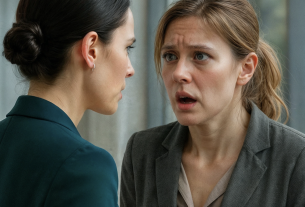Marina had always understood one simple truth: in the Berezkin family, she would always remain an outsider. Not because Alyosha didn’t love her—he adored his wife, saw in her his support and the meaning of his life. But behind that love stood an invisible yet strong wall, built over the years by Valentina Petrovna—his mother and Marina’s mother-in-law.
Anechka was the center of the universe for her mother. Her existence justified every sacrifice, every tear, every sigh. For Valentina Petrovna, the world revolved around her youngest daughter, and everything else was just background.
“Alyoshka, you know what kind of girl Anya is,” she often told her son, believing Marina didn’t hear. “She’s special. Not like us. She needs more attention. More care.”
These words hurt Marina. Not out of jealousy or envy—she had long accepted her role as “second fiddle” in this family. What tormented her was something else: she saw where this blind, almost fanatical love was leading.
Alyosha grew up responsible not because he wanted to, but because circumstances demanded it. At thirteen, he was delivering newspapers in the mornings, working after school, bringing home his first paycheck. His parents explained it simply: “Now we have Anya, we need money.” He never argued. He just silently took it all upon himself.
“I remember when he brought his first earnings home,” a neighbor told Marina. “Valentina Petrovna cried from sorrow and joy. And Alyosha stood there, so serious, even older than his years. The first thing he asked was: ‘Should I buy something for Anya?’”
Seven years had passed since their wedding. Nothing had changed. Only now, instead of him, Valentina Petrovna herself believed the son had a new “addition”—a wife with a good salary.
Anya, at twenty-three, looked like a model from a magazine cover. Long hair, bright eyes, a slender waist—she was generously gifted with looks. But beauty was the only gift fate gave her. Everything else—work, patience, perseverance—belonged to the older brother.
“Why would I want an office job?” she said when her parents hinted she should find something to do. “I’m not some kind of Lyoshka. I have other prospects.”
Each such word cut Marina like a knife. Her husband was a man with a mind, heart, and strength of spirit. He was building a career, had achieved a lot, and deserved respect—not the contemptuous tone of a younger sister.
“Talk to her,” Marina begged her husband after yet another family dinner. “She needs to understand she’s not the only one in the world.”
Alyosha sighed and stroked his wife’s hair.
“Marish, she hasn’t found herself yet. She needs time.”
“Seven years after school—isn’t that enough?” she couldn’t hold back. “Lyosh, open your eyes. Your sister doesn’t look for a job because she’s sure someone will do it for her.”
He was silent. He knew Marina was right. But admitting it meant admitting that the family he sacrificed himself for had raised a selfish person.
The breaking point came suddenly. A man named Andrey appeared in Anya’s life—a thirty-five-year-old with expensive watches, confident manners, and vague stories about business. He arrived in different cars—BMW, Mercedes… Everything about him was beautiful but too smooth.
“Mommy, did you see his suit?” Anya gushed. “I immediately knew—this is my man!”
Valentina Petrovna rejoiced. Alyosha met his sister’s new suitor with caution but said nothing. Marina immediately sensed something was wrong.
“There’s some catch,” she told her husband. “Everything is too perfect. Why hasn’t he ever talked about his work specifically?”
“Maybe he’s just cautious,” Alyosha shrugged. “Not everyone’s as open as you and me.”
But Marina wasn’t calm. Her intuition warned her—it was bad news.
After a month of dating, the “small” favors began. Andrey asked for money for gas, gifts for partners, “urgent” expenses. Anya turned to her parents, who helped as they could, then went to her brother.
“Alyoshka,” their mother cried, “this is her chance! Andrey is a serious man. Just temporary difficulties.”
And Alyosha gave money again. Marina remained silent, but every bill given felt like a stone on her heart.
“This will end badly,” she whispered to her husband at night. “Lyosh, I feel like they’re leading us to the abyss.”
“What can I do?” he answered tiredly. “Forbid her from seeing him? She’s already an adult.”
“Then stop funding this relationship.”
“But what if he really loves her? What if they have a future?”
Marina saw how her husband suffered, torn between the family he grew up in and the one he created himself. She was silent, holding a grudge, waiting for the moment everything would collapse.
It came in February.
Andrey offered Anya a “golden” deal—investment in a promising startup. They needed only 500,000 rubles. In six months, they would be millionaires. Buy a house. Get married. Life would start anew.
Anya took out a loan. Gave him the money. And a week later—silence. The number was unreachable. Profiles deleted. The cars turned out to be rented. Andrey vanished.
Anya was hysterical. Valentina Petrovna cried, blaming the whole world. But the debt remained. Real, cold, monthly.
“Alyoshka,” their mother called, “you understand, Anya won’t cope. Help— you both earn well.”
Marina stood nearby, listened to every word, and saw her husband’s lips tighten. Saw something inside him break.
“Mom, let’s meet,” he finally said. “We need to talk calmly.”
The meeting took place at the parents’ house. Anya sat red from crying, Valentina Petrovna held her hand like a child. Alyosha and Marina sat opposite.
“We can’t pay the entire loan at once,” Alyosha began, “but we’re ready to help with monthly payments—on condition that Anya starts working.”
“What work?” Anya sobbed. “Everyone will laugh at me.”
“No one will,” Marina said firmly. “That’s only in your head. Find a job, start earning—and we’ll help. Otherwise, you’ll spend your whole life living off your brother and parents.”
“How dare you!” Valentina Petrovna shouted. “She’s my daughter, not yours!”
“That’s exactly why she turned out the way she did,” Marina couldn’t hold back. “Because to you, she’s not a daughter, but a deity who’s allowed everything.”
“Marina!” Alyosha tried to stop her.
“No, Lyosh,” she turned to her husband. “Enough silence. Your sister, at twenty-three, can do nothing but look beautiful. She doesn’t work, doesn’t take responsibility, doesn’t live. And do you know why? Because you all decided everything for her her whole life.”
“But what about the loan?” Valentina Petrovna cried.
“That’s her problem,” Marina said. “She took it out herself. She must be responsible.”
Silence fell in the room. Anya looked with hatred. The mother with bewilderment. Alyosha was silent, looking at the floor.
“Just because I’m your daughter-in-law doesn’t mean you can stick your hands into my wallet!” Marina said firmly. “Buy your daughter everything yourselves if you want!”
After those words, silence reigned. Thick, heavy. And in that silence, Marina understood: something in this family was broken. Perhaps forever.
“Lyosh,” their mother’s voice was quiet but trembling with hurt, “will you allow your wife to talk to us like that?”
Alyosha slowly lifted his eyes. Marina saw pain in his gaze—the very pain he had carried inside for years. He loved the family where he grew up. But he loved her too—his wife, who had been through everything with him: hardship, compromises, struggle for the future.
“Mom,” he finally said, “Marina is right. We helped Anya all her life. But she didn’t get better, more independent, or responsible. She only demanded more.”
“Lyosha!” their mother exclaimed.
“No, Mom, listen. I love Anya. I’ll always be her brother. But I can’t solve her problems anymore. Let her try at least once on her own. If she finds a job—even the simplest one—then we’ll help with the loan.”
“And if she doesn’t?” Valentina Petrovna asked.
“Then she’ll live with the consequences of her decisions,” Alyosha replied. “It’s her choice. And her responsibility.”
Marina took his hand. His fingers were cold, slightly trembling.
Two months passed. Anya didn’t look for work. Didn’t even pretend she wanted to start a new life. She habitually waited for someone to come to her rescue again. Valentina Petrovna went to banks, asked for restructuring, sold grandmother’s jewelry. But the debts did not decrease.
“Lyosh, help at least a little,” she called her son. “I can’t do anything anymore.”
“The condition stays the same,” he answered firmly. “Let Anya start working.”
“She can’t! She’s depressed!”
“Mom, depression isn’t cured with money. She needs a goal. Something to do. Work is the best therapy.”
Marina heard these conversations. Saw how her husband was exhausted. Losing interest in life. How a wall grew between them, built by other people’s problems.
One evening, after another call from his mother, she approached him.
“Lyosh,” she said quietly, “I understand how hard this is for you. But you have to make a choice.”
“What choice?” he asked, looking down.
“Between the past and our future. Between the family you were born into and the family we created together. Lyosh, I can’t watch you tear yourself apart anymore. And I don’t want to be part of what’s killing your sister from the inside.”
“And if I refuse to help, and she gets worse?”
“Maybe she will. But in time she’ll understand: no one else will live her life for her. And until then… she’ll never learn to be an adult.”
Alyosha was silent for a long time. Then he went to the window. Stood looking into the night.
“What if they hate me?”
“Maybe,” Marina nodded. “But better to be hated for the truth than loved for a lie.”
The next day, Alyosha called his mother.
“Mom,” he said, “Marina and I have made a decision. We won’t help with the loan until Anya starts working. Any job, even for a month—and we’ll begin helping. Six months—and we’ll pay together.”
“Lyosh, are you crazy? She’s your own sister!”
“Precisely because she’s my sister, I can’t keep doing what she should do herself. Mom, understand—we’re not Anya’s enemies. We want her to start living a real life.”
“What if the bank sues?”
“Then let them sue. That’s also part of life she must go through.”
Valentina Petrovna hung up. She never called again.
Marina saw how it hurt Alyosha. Felt every tear, every heartbeat. But she knew: there was no other way. And waited for what would come next.
The answer came a month later.
Anya found a job. Simple, low-paid—a sales clerk in a clothing store. But she worked. Earned. And for the first time in her life, did something with her own hands.
“Lyosh,” Valentina Petrovna cried into the phone, “Anya is working! She’s tired but working. She says she wants to prove to everyone she can do it herself.”
Alyosha looked at Marina. She nodded.
“We’ll help, Mom. But in parts. The rest she’ll pay herself.”
“Thank you, you and Marina,” the mother whispered.
When Alyosha hung up, Marina hugged him.
“Do you think it will work?” he asked.
“I don’t know. But now she has a chance. Before, she didn’t.”
A year passed. Anya not only kept her job—she was promoted to senior sales clerk. They paid off the loan together: Anya paid most of it herself, Alyosha helped with the rest. Valentina Petrovna was proud in a new way—not of her daughter’s beauty, but of her strength.
Once, Anya met Marina in a store and said:
“I hated you for a long time. For making Lyosh stop helping me.”
Marina tensed.
“But now I understand: you were right. If you had just paid everything then, I’d still be the same. And it would have all repeated again after a year.”
“It was hard for me too,” Marina admitted. “I saw how Lyosh suffered. How you suffered. But I knew: if we gave up then, you both would have lost more.”
“Thank you, Marish. Only now do I understand what it means to be an adult.”
Marina hugged her sister-in-law. For the first time in many years, she felt that Anya had become not just her husband’s relative, but a true sister.



